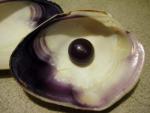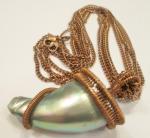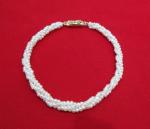Queen Elizabeth ll's Wedding Dress had 10,000 Seed Pearls from USA!

Princess Elizabeth's Wedding Dress
The wedding dress of Princess Elizabeth (the future Queen Elizabeth II) was worn at her wedding to Philip Mountbatten, Duke of Edinburgh on 20 November 1947 in Westminster Abbey. Given the rationing of clothing at the time, she still had to purchase the material using ration coupons. The dress was designed by Norman Hartnell. Hartnell's signature was said to be embroidery, and he enjoyed "working with soft, floating fabrics, particularly tulle and chiffon, and with plain, lustrous silks". The dress was made of Chinese silk, with a high neckline, tailored bodice and a short train. Without straps and with long sleeves, it provided a "fit and flare silhouette".
he wedding was a royal event held following the end of the Second World War. The dress, designed by the Court Designer Norman Hartnell, had a star-patterned fan-shaped bridal train that was 13 feet (4.0 m) in length. The train, symbolic of rebirth and growth after the war, was stated to be inspired by Botticelli's c. 1482 painting of Primavera, particularly the elaborate embroidery motifs of scattered flowers on the rich satin dress and the tulle veil worn by the royal bride. The material used was ivory silk and a diamond fringe tiara secured her veil. The dress was decorated with crystals and 10,000 seed pearls, imported from the United States of America. Hartnell, who had been Court Designer since 1938, claimed it as "the most beautiful dress I had so far made".
On account of the austerity measures following the war, Princess Elizabeth had to use clothing ration coupons to show her entitlement to the dress. The government allowed her 200 extra ration coupons. She was given hundreds of clothing coupons by brides-to-be from all parts of the country to help her acquire the dress. She had to return these coupons as it was illegal for them to have been given away in the first instance.
The designs for the dress were approved three months before the wedding. Hartnell's search for suitable designs in London art galleries had led to him to the Botticelli figure. This was the inspiration for the use of ivory silk with flower designs of jasmine, smilax, lilac and white rose-like blossoms added to the train, embellished by white crystals and pearls. These motifs were transferred to drawings to enable embroidery experts to work on them. The dress featured a "heart-shaped neckline and long tight sleeves".
https://en.wikipedia.org/wiki/Wedding_dress_of_Princess_Elizabeth_of_the_United_Kingdom
Join in and write your own page! It's easy to do. How? Simply click here to return to Pearl News.









